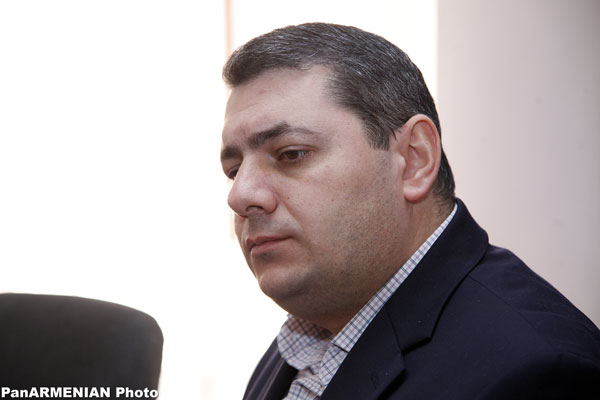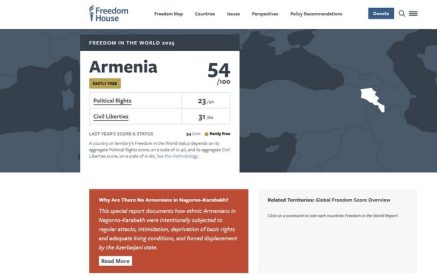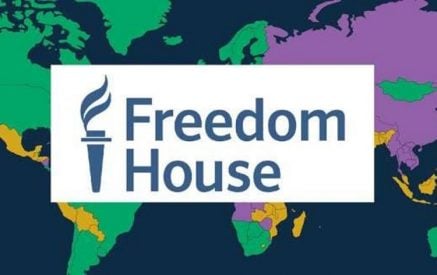Unlike Armenia and Georgia, people in Azerbaijan consider unresolved conflicts in the region a primary issue, whereas in our and neighboring countries, over 4 years, the primary issue for many of us is the unemployment and the poverty.
In 2013, pursuant to the research data among 6,000 households conducted by the Caucasus Research Resource Center of Armenia (www.crrc.am), 45 % of respondents in Armenia perceived the core problem to be the unemployment, 16 % – the poverty, and in Georgia, 54 % and 10 %, respectively, in Azerbaijan, the issue of unresolved conflicts is followed by unemployment and poverty – 38 % and 25 %, respectively.
Pertaining to the freedom of expression, 68% of respondents in Armenia expressed the opinion that he has the right to freely express his opinion, and only 52 % of respondents in Azerbaijan think so, and in Georgia – 76%. In fact, according to the research conducted by this Center, in Armenia, the number of people considering the country non-democratic, if in 2011, 27% of same number of respondents was thinking about the same, in 2013, this number reached 34 %. In 3 countries, according to the data of the Center, people are well informed about the regional conflicts existing in neighboring countries. For instances, approximately half of the respondents in Armenia and Azerbaijan had not even heard of the Georgian-Abkhazian conflict, Georgian people are more aware of the Karabakh conflict.
In the interview with Aravot.am, the Head of CRRC Political Research Department Sergey Minasyan doubted that the primary problem for Azeri respondents was not the socio-economic issue, but the unresolved regional conflicts.
Read also
This research, according to the political scientist, was subjected to serious political pressure in Azerbaijan, if not, then at least this item was forcedly included. Mr. Minasyan, being aware of the regional community and available problems, being well aware of the research data, noted that the research findings were to be almost the same in the 3 countries because by another research, the socio-economic issue was also primary in Azerbaijan.
As an evidence of the Azerbaijan survey response being non-objective, the political scientist noted that in this country of oil, the poverty between the rich of oil peninsula and other regions of the country is quite polarized, hence, it is impossible for the people in this country to consider the poverty a secondary issue. Mr. Minasyan said, “I have doubts that the research in Azerbaijan was conducted in the same form and by the same scientific accuracy, because at least the attitudes to breakaway territories seemed to be the same in Azerbaijan and Georgia.”
The political scientist reminded of recent Azerbaijani journalist Rauf Mirkadirov’s case. Recall that currently the journalist is in a solitary confinement cell of the Azerbaijani National Security Ministry for his multiple tough criticisms to Erdoğan.
Mr. Minasyan also noted that with regard to freedom of expression, of course, we are talking about the public perception rather than propriety. “If we compare Georgia and Armenia, in our country the perceptions about corruption and freedom of expression are different, but the real picture is very similar, even “Freedom House” has rated the component of civil society unprecedentedly high in Armenia that in Georgia, despite the fact that democracy, elections and alike. One more remarkable indicator also: the average level of happiness in the 3 countries is almost the same, Armenia – 6.7 points, Azerbaijan – 6.6, and Georgia – 7.0. The fact that Azerbaijanis and Armenians are happy nearly the same, according to the political scientist, talks about that social conditions are the same, therefore, the response of the survey that unresolved regional issues are primary for Azeri raises contradiction in the responses. According to results published by the Center, the opinion about the independence of the courts from the impact of authorities is shared by 13% of respondents in Armenia, 25% in Azerbaijan, and 33 % in Georgia.
With regard to the question of their country’s accession to the EU, 65% of respondents in Georgia, 41 % in Armenia, and 34 % in Azerbaijan are in favor of accession. Whereas, to the question of the accession to the Eurasian Economic Area-CU, 55 % respondents in Armenia and 32 % in Georgia are in favor of accession, there is no information about Azerbaijan. Pertaining to this question, Mr. Minasyan noted that if the question was put as EU or MM, the survey results might have been different.
Nelly BABAYAN























































